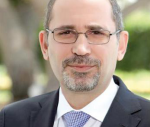You are here
Bridging global health’s racial divide
Jul 28,2021 - Last updated at Jul 28,2021
By Jeanne Moutoussamy-Ashe and Wayne C. Koff
NEW YORK — After the late Arthur Ashe contracted HIV/AIDS, he commented that the heaviest burden he had to bear was not the disease but being born black in America. In addition to facing systemic racism, black people in the United States suffer disproportionately from disease and have shorter life expectancies and less healthy lives. During the COVID-19 pandemic, African-American and indigenous communities have suffered dramatically higher rates of hospitalisation and death and vaccine hesitancy among some black people, due to their history of being medically exploited, remains a challenge.
Bridging this racial divide is a prerequisite for achieving a new and equitable era in global health. But today, there is far less clinical research involving people of African descent than white populations, particularly in genetics, immunology and related disciplines. Unless we redress this racial imbalance, black people, as well as indigenous groups, Latinx, and other people of colour, will continue to be left behind.
For example, people with European ancestry make up just 16 per cent of the global population, but account for nearly 80 per cent of participants in genetic studies. Moreover, less than 2 per cent of genomes analysed to date are from African people, even though the African diaspora contains the greatest genetic diversity. Thus, as scientists race to unlock the secrets of our DNA, the knowledge gained so far is heavily biased.
Likewise, our knowledge of the human immune function is being distorted by data that vastly over represent certain populations, primarily those of white European descent. This can lead to mistakes, such as researchers’ former erroneous belief that cystic fibrosis, a genetic disorder, was not present in African populations. Genetic diagnosis had focused on variants found in European populations and missed those occurring among Africans.
Twenty years ago, the sequencing of the human genome launched a revolution in biomedical research. But the technologies back then were not advanced enough to decode the human immunome, the body’s complex immune system for preventing and controlling diseases. Today, with the convergence of recent advances in biomedical sciences and artificial intelligence, we have the tools to do this, and potentially transform the future of human health. But we need to make sure that this revolution benefits everyone, and not just a privileged few. Unfortunately, racial inequity in biomedical research remains a major obstacle to achieving this vision.
In the US, black people are glaringly underrepresented in clinical trials, and experience higher rates of illness than white Americans. Black babies are nearly two and a half times more likely to die in infancy than white babies, while black women are two to three times more likely than white women to die in childbirth. Black Americans are three times more likely than white Americans to die from asthma and their average life expectancy is over four years shorter. African-American communities also have worse health outcomes with cancer, heart disease, and HIV, and are more susceptible to some autoimmune diseases, such as systemic lupus erythematosus.
Many of these health outcomes are linked to systemic racism and poverty, and to differences in income, education, housing, employment, and access to healthcare. But limited biomedical research in these populations, combined with the social factors contributing to increased poverty and disease, impedes progress and serves to reinforce health inequities rather than mitigate them.
Tackling racial inequity in biomedical research requires a multipronged approach, starting with addressing the structural racism that has existed within the medical system. Given the previous exploitation of these communities in clinical research, from Tuskegee to Henrietta Lacks, many populations have longstanding and justifiable mistrust of the medical-research system. To address this, the scientific community must continue to expand its diversity and inclusion of both researchers as well as study participants. This includes much greater community involvement and outreach, and building understanding of the risks and benefits of research findings for individuals and communities.
Second, we need a significant increase in resources for population-based clinical research studies of genetics, immunology, and related disciplines among the African diaspora, as well as indigenous and Latinx communities. These resources could come from both the private and public sectors, including corporations, foundations, and government. The recent call for the Three Million African Genomes project is a step in the right direction. Ethics committees should examine the recruitment balance between different groups as part of their assessment of trial protocols, and make sure that populations are equitably represented.
Lastly, we need to address black communities’ concerns and participation in biomedical research by building equitable and inclusive coalitions of scientists and medical professionals (giving particular attention to including black voices), health activists and advocates, and community members. These groups could serve as a conduit for people to share their medical concerns and past traumas. They could lead significant, grassroots educational efforts, based on open exchange and trust, to persuade African-Americans of the benefits of participating in research, while also allowing healthcare workers to share information and best practices.
The world is poised to make transformative advances in disease prevention and control over the coming decades. The global COVID-19 response, with scientists developing multiple effective and safe vaccines in under a year, was unprecedented and underlines the potential to build a new, equitable age of global health.
But this revolution needs to include and benefit all people, and not become skewed disproportionately toward those with a particular skin colour or socioeconomic status. Bridging the current racial divide in medical research will benefit us all, and it has never been more important.
Jeanne Moutoussamy-Ashe, a fine-art photographer and author, is a director of the Arthur Ashe Endowment for the Defeat of AIDS. Wayne C. Koff, president and CEO of the Human Vaccines Project, is an adjunct professor of epidemiology at the Harvard T.H. Chan School of Public Health. Copyright: Project Syndicate, 2021. www.project-syndicate.org












